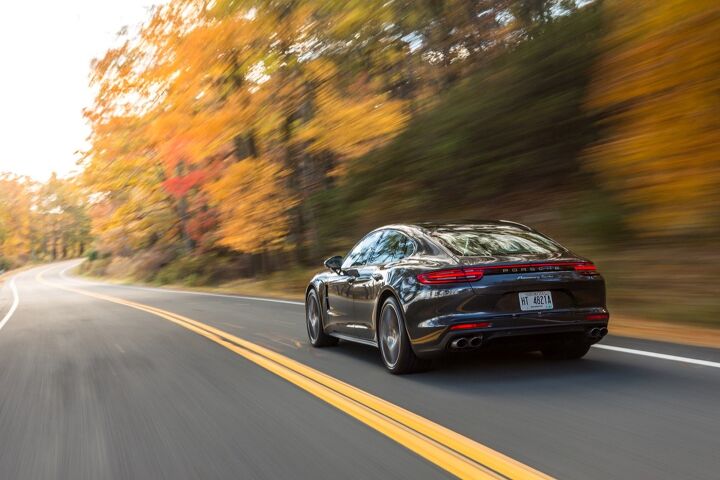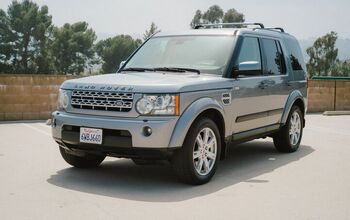After Falling Out of Love, Porsche's Diesel Divorce Is Now Complete

It always felt little odd whenever a diesel-powered Cayenne sidled up to you next to a stoplight. A Porsche that builds SUVs, we used to mull, and diesels, no less!
The public’s discomfort with a German sports car maker entering the utility vehicle field is long gone, and we can now say the same for Porsche’s short-lived dalliance with diesels. The automaker has stated it’s pulling its last remaining oil-burning models off the market.
A new Porsche is born, cleaner, but perhaps no purer.
According to Autocar, Porsche has discontinued the Macan S Diesel and Panamera 4S Diesel, both European models that were never touched by buyers across the pond. The Cayenne Diesel, which kicked off the brand’s affiliation with compression ignition in 2009, might disappear with the launch of the next-generation model later this year. Porsche tentatively claimed it would field a diesel variant, but hasn’t confirmed a launch date.
In North America, the Cayenne Diesel met an earlier fate during the Volkswagen emissions scandal. In that uber-expensive brouhaha, late-model 3.0-liter TDI models like the Cayenne found themselves in the EPA’s crosshairs. No North American VW Group vehicle carries a diesel anymore.
Porsche was never an enthusiastic adopter of the technology, choosing to borrow engines from the VW Group parts bin rather than develop its own. With diesel sales declining in Europe (volume was down 7.9 percent last year) and governments and regulators howling for cleaner air in cities, diesel’s European tombstone is already in the process of being etched.
The company’s comments to Autocar suggest that the continent’s new testing regimen is behind the dropping of the two models. Porsche doesn’t want to sink any money into bringing diesel engines into compliance with updated emissions standards.
Last year, Porsche CEO Oliver Blume said diesel sales made up just 15 percent of the brand’s volume, and the automaker was spivoting its R&D spending towards electrification. In his view, diesel just wasn’t that important to the company’s long-term fortunes.
In a recent statement on Porsche’s website, R&D board member Michael Steiner laid out the company’s electrification plans while touting the all-electric Mission E sedan, scheduled to enter production by the end of 2019.
“During an initial stage, we will offer electrically powered versions of existing model lines,” Steiner explained. “In addition, however, work will continue on the development of other purely electric vehicles following the example of the Mission E. To speed up progress in this area, Porsche has joined forces with Audi to set up the Premium Platform Electric. Teams from both brands will work together to lay the foundations for future e-vehicles. At the same time, Porsche is forging ahead with hybridisation of the drivetrain.”
Already, there’s been a sharp uptick in European interest for Porsche’s plug-in E-Hybrid lineup. Blame juicy tax incentives for models’ popularity. If governments plan to punish diesel car use, why wouldn’t Porsche pursue the technology that governments reward?
[Images: Porsche]

More by Steph Willems
Latest Car Reviews
Read moreLatest Product Reviews
Read moreRecent Comments
- Varezhka I have still yet to see a Malibu on the road that didn't have a rental sticker. So yeah, GM probably lost money on every one they sold but kept it to boost their CAFE numbers.I'm personally happy that I no longer have to dread being "upgraded" to a Maxima or a Malibu anymore. And thankfully Altima is also on its way out.
- Tassos Under incompetent, affirmative action hire Mary Barra, GM has been shooting itself in the foot on a daily basis.Whether the Malibu cancellation has been one of these shootings is NOT obvious at all.GM should be run as a PROFITABLE BUSINESS and NOT as an outfit that satisfies everybody and his mother in law's pet preferences.IF the Malibu was UNPROFITABLE, it SHOULD be canceled.More generally, if its SEGMENT is Unprofitable, and HALF the makers cancel their midsize sedans, not only will it lead to the SURVIVAL OF THE FITTEST ones, but the survivors will obviously be more profitable if the LOSERS were kept being produced and the SMALL PIE of midsize sedans would yield slim pickings for every participant.SO NO, I APPROVE of the demise of the unprofitable Malibu, and hope Nissan does the same to the Altima, Hyundai with the SOnata, Mazda with the Mazda 6, and as many others as it takes to make the REMAINING players, like the Excellent, sporty Accord and the Bulletproof Reliable, cheap to maintain CAMRY, more profitable and affordable.
- GregLocock Car companies can only really sell cars that people who are new car buyers will pay a profitable price for. As it turns out fewer and fewer new car buyers want sedans. Large sedans can be nice to drive, certainly, but the number of new car buyers (the only ones that matter in this discussion) are prepared to sacrifice steering and handling for more obvious things like passenger and cargo space, or even some attempt at off roading. We know US new car buyers don't really care about handling because they fell for FWD in large cars.
- Slavuta Why is everybody sweating? Like sedans? - go buy one. Better - 2. Let CRV/RAV rust on the dealer lot. I have 3 sedans on the driveway. My neighbor - 2. Neighbors on each of our other side - 8 SUVs.
- Theflyersfan With sedans, especially, I wonder how many of those sales are to rental fleets. With the exception of the Civic and Accord, there are still rows of sedans mixed in with the RAV4s at every airport rental lot. I doubt the breakdown in sales is publicly published, so who knows... GM isn't out of the sedan business - Cadillac exists and I can't believe I'm typing this but they are actually decent - and I think they are making a huge mistake, especially if there's an extended oil price hike (cough...Iran...cough) and people want smaller and hybrids. But if one is only tied to the quarterly shareholder reports and not trends and the big picture, bad decisions like this get made.



































Comments
Join the conversation
According to Porsche's web site, MSRP for a 2018 Cayman S with no options is $67,700 plus $1,050 for delivery, etc. In 2007, I looked at the Cayman for my retirement present to myself. If I remember correctly, base price for an S was about $60k. Base price for a non-S Cayman was $50k. It is now $55k which isn't bad for 10 years' inflation.
An SUV without a diesel option in Europe? That will negatively affect sales, especially in large SUVs like the Macan. Based on visual observation, most Cayenne and Macan SUVs that I have seen are diesel-powered.